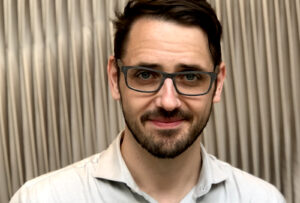Introducing… Kalle Westerling
We’ve asked each member of the Living with Machines team to introduce themselves in their initial blog post.
What’s your name?
Kalle Westerling.
What’s your background?
Prior to working with Living with Machines, I completed my PhD in Theatre and Performance at the City University of New York (CUNY). My academic interest lies in the history of theatre and fashion, and more specifically, gender-nonconforming performance. I have written on performance cultures of drag, and their contemporary and historical political aesthetics in both popular press and academic articles.
In the interdisciplinary corridors of The Graduate Center, I encountered the world of Digital Humanities (DH) and became involved in the university’s many programs teaching DH skills to faculty members, students, and building networks far beyond the institutions, around the city of New York and the country. I started out as a student in their DH Research Institute and for a few years thereafter, I was the Project Manager for a spin-off project, the Digital Humanities Research Institutes where I helped seed funding and assistance to scholars and administrators in building similar programs at other universities across the United States.
My own project, consequently, took its inspiration from many of the people I met and worked with in all these different parts of CUNY. Using network visualisations, I argued, allows us to see in new ways how the “pansy craze” of the 1920s cities, impacted and created a transitory and itinerant queer drag culture outside of U. S. cities in the 1930s.
In one sentence, what is your role on the project?
I am a Digital Humanities Research Software Engineer with a specific focus on spatial and temporal representations of complex historical datasets, and building interfaces for our project’s research methods and technologies.
What excites you about the project?
Coming directly from finishing my own (relatively) small-scale dissertation project into this massive, multidisciplinary project with so many great minds working together cannot be anything but the most exciting thing. The project also promises not only to unearth groundbreaking conclusions around life in the industrial revolution, but also a plethora of new technologies and writing history of a different scale than has been done before. That excites me, as it means I get to continue asking similar questions as I had started in my own dissertation research, but in a whole new context and together with others. This collaborative premise of the project altogether makes me very enthusiastic.
What challenges do you see ahead?
On the flip side, I think collaboration is not necessarily easy. In the little time I have spent on the project so far, I have already seen the necessity for good communication structures, documentation, and the potential bloating of projects when many great minds are involved and excited. We have some of it in place, and we are also learning a lot about the very activity of collaboration in the project itself.
What’s the last (non-work) book you read, exhibition or performance you saw?
I saw the delightful Broadway production of Beetlejuice in New York on my visit there last week. It had the perfect combination of comedic timing, technological marvel, and the good old regular silliness that should be (!) part of such shows.
Where can we find out more about you and your work?
I am on Twitter (@kallewesterling) and try to keep my personal website up to date.

